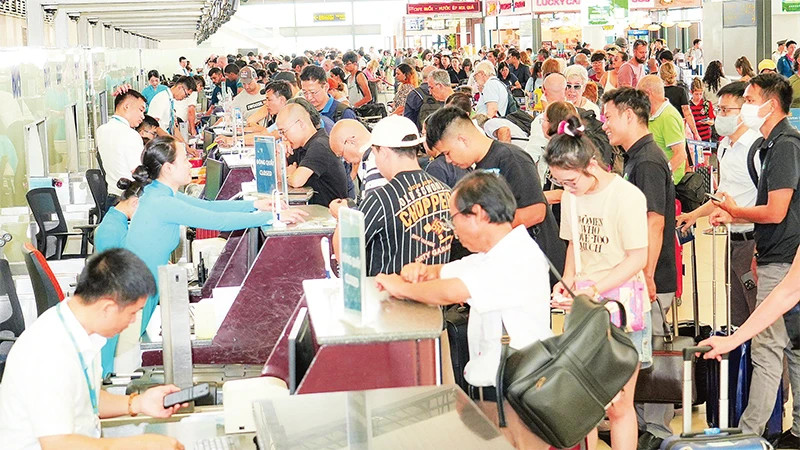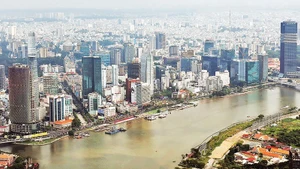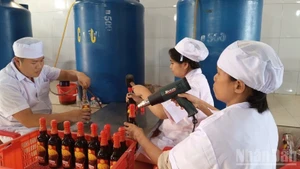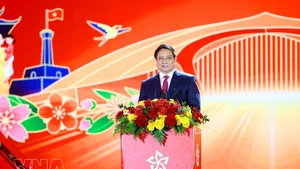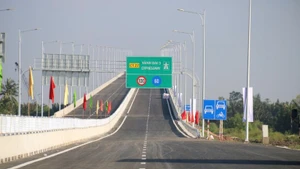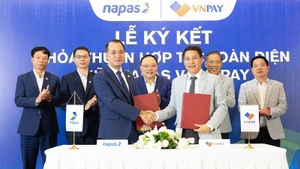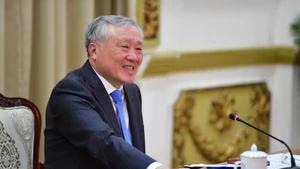According to statistics from the Civil Aviation Authority of Vietnam, the booking rate for the next month on domestic routes is higher than the average for some routes connecting tourist destinations from localities, especially on weekends and days close to departure times.
Airfares "cool down"
Recently, the increase in airfares has had a significant impact on the transportation market. The main reason was that some airlines had to stop the operation of many aircraft for engine maintenance, as required by the manufacturers and some others restructured and reduced the number of aircraft.
At a recent conference on aviation-tourism linkage organised by Nhan Dan Newspaper, Nguyen Quang Trung, Head of the Planning and Development Department under the Vietnam Airlines Corporation said in fact, the increase in airfares is part of the general trend of the global aviation industry, due to the impact of high fuel prices, with an average increase of 34% in 2024, compared to 2019 (from 76.7 USD per barrel to 102.8 USD per barrel).
According to Luong Hoai Nam, General Director of Bamboo Airways, airfares will only cool down when the number of aircraft increases. Currently, domestic airlines are operating about 160 aircraft, a decrease of 60-70 aircraft compared to the period before the COVID-19 pandemic. Although it is still possible to lease aircraft, the airlines do not want to carry them home because the more they fly, the more they lose. "The current cost level combined with the price ceiling mechanism makes domestic flights unprofitable. It is necessary to create incentives for airlines to bring aircraft back and open more routes so airfares can cool down”, said Nam.
Currently, the average booking rate on flights from Hanoi and Ho Chi Minh City to localities reaches more than 50% on the days leading up to and on weekends, and between 20-40% on further days. Some tourist routes from Hanoi and Ho Chi Minh City have higher than average rates such as Hanoi-Quy Nhon (Binh Dinh), Hanoi-Phu Quoc (Kien Giang), Hanoi-Nha Trang (Khanh Hoa), Ho Chi Minh City-Nha Trang, and Ho Chi Minh City-Dien Bien.
Regarding airfares, Vietnamese airlines have announced many levels for their flights, many of which are significantly lower than the maximum level prescribed for basic economy class.
For example, for the Hanoi-Quy Nhon route, the price excluding taxes and fees ranges from 1.9 million to 2.4 million VND, equivalent to 67-83% of the prescribed maximum level (2.89 million VND). For the Hanoi-Phu Quoc route, the price excluding taxes and fees ranges from 2.7 million to 3.4 million VND, equivalent to 69-87% of the prescribed maximum level (4 million VND). For departure dates further away, the airlines have also announced many low prices for passengers to choose from.
“It can be seen that when planning to book flight tickets early and far from the departure date, in addition to having more opportunities to book seats on crowded routes, passengers will also have many options for prices suitable to their conditions and travel needs”, said a representative from the Civil Aviation Authority of Vietnam.
Passengers planning their travel and booking tickets early also allows airlines to proactively allocate resources, optimise aircraft operations, limit flight cancellations, and reduce pressure in the context of the current shrinking aircraft fleet.
Support for development of the aircraft fleet
Deputy Director of the Civil Aviation Authority of Vietnam Do Hong Cam said according to research and assessment by the Association of Asia-Pacific Airlines (AAPA), airfares in the world today and in the coming time, will tend to increase more than before.
"With the current situation where airlines are facing high fuel costs, pressure to upgrade their fleets, additional leasing/purchase and maintenance of aircraft, human resource shortages, airport service prices, etc., it is forecasted that global airfares will increase by 3-7% in 2024 and will continue to increase in the following years”, Cam said.
Having identified the difficulties and challenges in 2024, the aviation industry has promptly carried out measures to minimise negative impacts and ensure appropriate supply. The Civil Aviation Authority of Vietnam has created conditions for airlines to increase operations, optimise the exploitation of the existing fleets, accelerate the process of searching and negotiating to lease additional aircraft during peak periods, coordinate take-off and landing times effectively, and adjust the operating time of aircraft during the day of airlines to transfer flights.
In reducing ticket prices, airlines all set prices from low to high so that the majority of customers and people can access their payment level. In the new context, the airlines also need to survive and develop, if there is no profit, they will not attract the opening of more airlines. Leaders of the Civil Aviation Authority of Vietnam hoped that the localities would pay attention to the linkage between aviation and tourism industries, contributing to the airlines’ increase of flight routes and supporting the solution of input costs.
Le Hong Ha, General Director of Vietnam Airlines Corporation, acknowledged that there is still much room for cooperation to reduce ticket prices and improve efficiency between aviation and tourism. Tourism businesses should consider reducing f the price for the first night's stay for passengers flying at night. The aviation and tourism industries must "join hands" more substantially and clearly, to attract, promote, and create new markets and new habits, to effectively exploit this potential. In the context of the Vietnamese and world aviation industries lacking aircraft, the airlines should enhance close coordination, share experiences and methods, and strive to exploit them most effectively.
Deputy General Director of Vietjet Air Do Xuan Quang, suggested that to help Vietnam's aviation and tourism develop, it is necessary to build programmes to promote Vietnam's tourism at the national level and support sustainable tourism development. The long-term combination of tourism and aviation businesses is needed based on companionship and sharing common benefits.
"In the context of many challenges for both tourism and aviation industries, we recommend that the Government should continue to have a support mechanism on environmental taxes for gasoline products and reduce fees for new international routes; meanwhile, the banking sector needs to reduce interest rates for aviation, hotels, tourism, etc. We also recommend that the State have a policy to support the development of the fleet of Vietnamese airlines, with aviation authorities managing flight slots (take-off and landing times) and effectively managing operations at airports to increase capacity through airports”, Do Xuan Quang noted.
